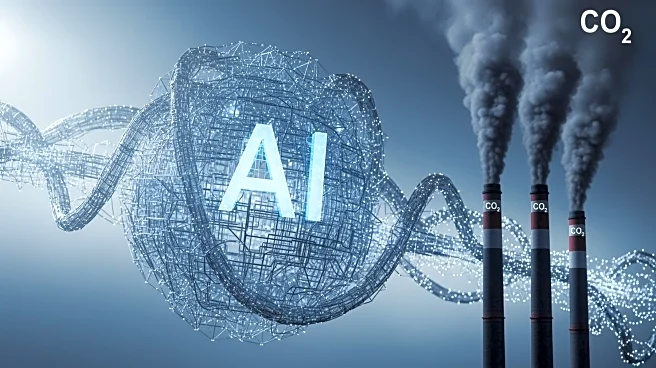What's Happening?
A study published in Environmental Research Letters reveals that the adoption of artificial intelligence (AI) across the United States is projected to add approximately 900,000 tons of CO2 emissions annually.
This increase represents 0.02% of the total U.S. emissions. The study highlights that while AI adoption is expected to enhance productivity and economic output, it also contributes to a modest environmental footprint compared to other industrial activities. The research estimates that energy use in individual industries could rise by up to 12 petajoules annually, equivalent to the electricity consumption of around 300,000 U.S. homes. Researchers emphasize the importance of integrating energy efficiency and sustainability into AI strategies to ensure responsible growth as AI adoption scales.
Why It's Important?
The findings underscore the need for industries to consider the environmental impact of AI technologies as they become more integrated into daily operations. While the projected emissions are relatively minor compared to other sectors, they still represent a meaningful increase. This calls for industry leaders to incorporate energy efficiency and sustainability into AI development and deployment. The study suggests that responsible growth in AI adoption can help mitigate its environmental impact, ensuring that the benefits of AI do not come at the expense of increased carbon emissions.
What's Next?
As AI technologies continue to expand across various sectors, industry leaders are encouraged to adopt strategies that prioritize energy efficiency and sustainability. This includes developing AI systems that minimize energy consumption and carbon emissions. The study advocates for ongoing research and collaboration among stakeholders to address the environmental challenges associated with AI adoption. By integrating sustainable practices, industries can balance the benefits of AI with its environmental impact, paving the way for responsible technological advancement.
Beyond the Headlines
The study highlights the ethical responsibility of industries to address the environmental implications of AI adoption. As AI becomes more prevalent, there is a growing need to consider its long-term impact on the environment and society. This includes exploring innovative solutions to reduce energy consumption and emissions associated with AI technologies. The research calls for a collaborative approach among industry leaders, policymakers, and researchers to develop sustainable AI practices that align with global environmental goals.










